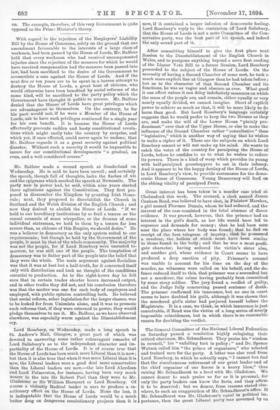After committing himself to give the first place next Session
to the Disestablishment of the English Church in Wales, and to postpone anything beyond a mere first reading of the Liquor 'Veto Bill to a future Session, Lord Rosebery proceeded to the subject of the House of Lords. On the necessity of having a Second Chamber of some sort, he took a much more explicit line at Glasgow than he had taken before ; but as to the character of that Second Chamber and its functions, he was as vague and obscure as ever. What good it can effect unless it can delay indefinitely measures on which" the mass of the people are, and remain, either equally or very nearly equally divided, we cannot imagine. Short of explicit power to achieve as much as that, it will be more likely to de harm than good. But Lord Rosebery's language certainly suggests that he would prefer to keep the two Houses as they are, and make the will of the Lower House "plainly pre. dominant" over that of the Upper House, or else to make the influence of the Second Chamber rather " consultative " than' "legislative," which is another way of saying that he wishes to make a cipher of it. These are the subjects on which Lord, Rosebery cannot or will not make up his mind. He wants to catch the votes of the country for paralysing the House of Lords, before he confides to us to what he wishes to reduce its powers. There is a kind of wasp which provides its young with half-paralysed grasshoppers to eat in their infancy.. And it appears to be the happy destiny of the House of Lords,. in Lord Rosebery's view, to provide sustenance for the demo- cratic House of Commons. Young Democracy will feed oni the ebbing vitality of paralysed Peers.


















































 Previous page
Previous page